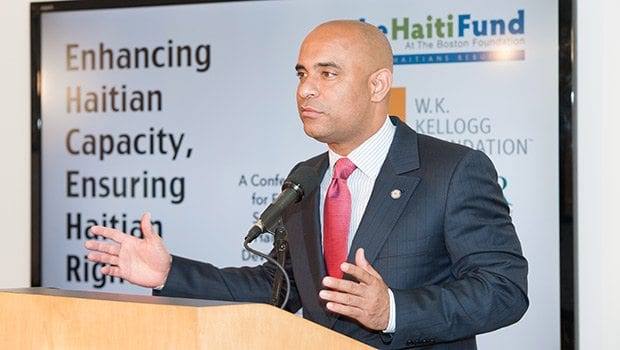Haitian prime minister asks U.S. funders for continued investment in island’s recovery efforts

Four years after a magnitude 7.0 earthquake nearly leveled Port-au-Prince, Haiti is still digging its way out of the disaster, rebuilding housing, schools and critical infrastructure.
And if Haitian Prime Minister Laurent Lamothe is successful in his efforts to attract investment to the island nation, Haiti will become a competitor in the global economy.
“We hope for Haiti to be an emerging nation by 2030,” Lamothe said, speaking during a conference of the Haiti Fund held at The Boston Foundation last week.
The conference brought together private foundations and donors to discuss challenges to rebuilding Haiti.
A U.S.-educated business man, Lamothe built a global telecommunications firm specializing in developing countries and was recognized in 2008 as an Entrepreneur of the Year by the accounting firm Ernst and Young.
He served as a special adviser to Haitian President Michel Martelly, became a member of the Interim Commission for the Reconstruction of Haiti in the wake of the 2010 earthquake, and was designated Prime Minister in 2012.
Following the earthquake, international aid flowed into Haiti — food, emergency shelter and aid workers. While the international community pledged more than $1.5 billion in aid, much of that went into refugee camps, where 1.5 million Haitians were housed.
In the years following the quake, the Haitian government has been working to rebuild infrastructure.
“Many people are helping Haiti, but we’re not going to succeed until we help ourselves,” he said, citing improvements in governance, increased private investment and increased collection of tax revenues as benchmarks for progress.
Lamothe says that while 90 percent of the refugees from the earthquake have been relocated to permanent housing, schools remain an issue.
“We have a deficit of 4,000 schools,” he said, noting that his government is rebuilding its ministry of education, adding new staff and new teachers. “We need schools, but we also need the ministry to allocate the funds for the schools.”
Before the earthquake, Haiti’s problems ran deep. Access to public schools there has been limited to just 10 percent of the population. And with private school fees averaging $200 a year, few could afford to send their children there. The per capita Gross Domestic Product in Haiti is $750 a year, and the average Haitian family has four children.
The Haitian government has also begun to provide assistance to people who live in extreme poverty there, including a large population of physically disabled Haitians with a social service assistance program. More than two million people have benefitted from the program, called Help the People, Lamothe said.
The challenges Lamothe’s government faces in attempting to build Haiti’s economy are immense. Although more than $1 billion in aid has been spent on earthquake recovery, most of that funding was spent on food supplies not grown or produced in Haiti, and medicines, shelters and other emergency supplies that come from other countries. Very few aid dollars circulated in Haiti’s devastated economy. Very little aid went to Haiti’s government, which Lamothe says he is still trying to rebuild.
“Haiti’s government was weak to begin with,” says Riche Zamor, executive director of Healing Hands for Haiti. “The earthquake hit and it killed the government. The government is now rebuilding, but the resources are minimal.”
Although Haiti threw off its colonial shackles in 1804, the nation’s economy never moved far beyond the colonial resource extraction model it operated under during French rule. Throughout the island’s history, a small class of light-skinned Haitians has dominated the economics and politics there.
Lamothe said the island is plagued by a brain drain, the process where better-educated citizens move abroad, seeking better opportunities. He said Haiti is seeking investment from its large diaspora, much of which resides in the United States.
“We need to mobilize the diaspora not only to send money to their families, but also to contribute to the future of Haiti,” he said.
Lamothe encouraged the audience at the funders conference to invest in Haiti, to vacation there and build vacation homes and businesses there.


![Banner [Virtual] Art Gallery](https://baystatebanner.com/wp-content/uploads/2024/04/Cagen-Luse_Men-at-store-e1713991226112-150x150.jpg)



